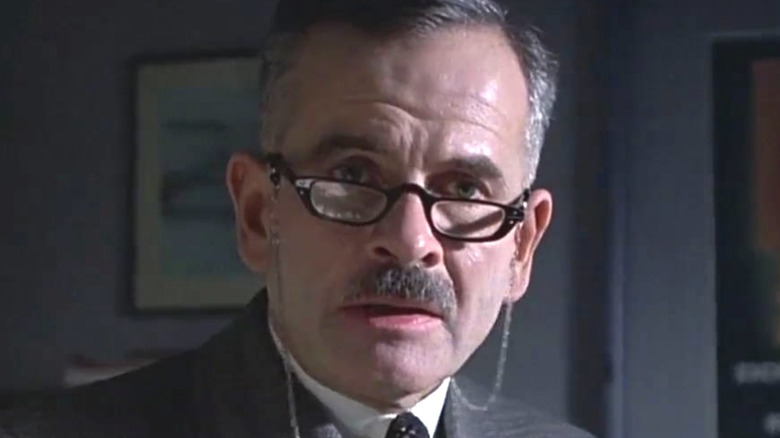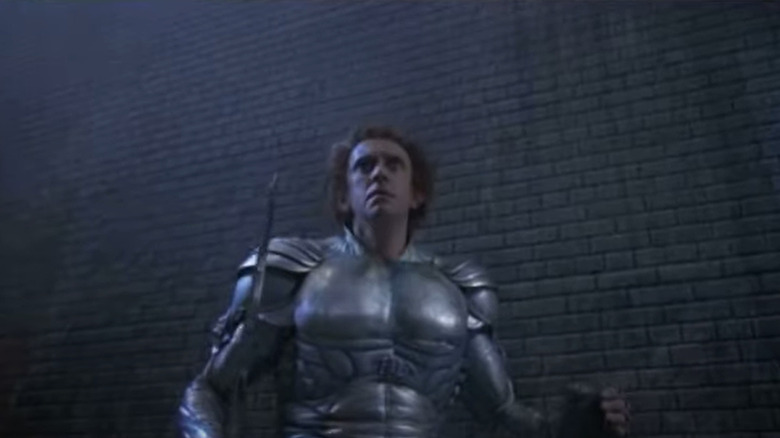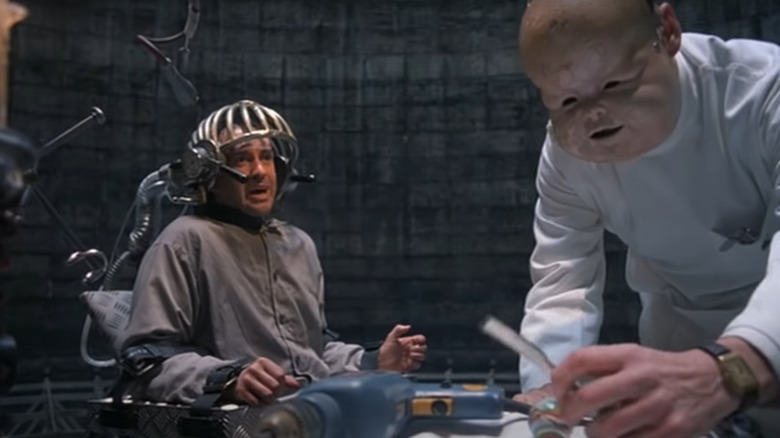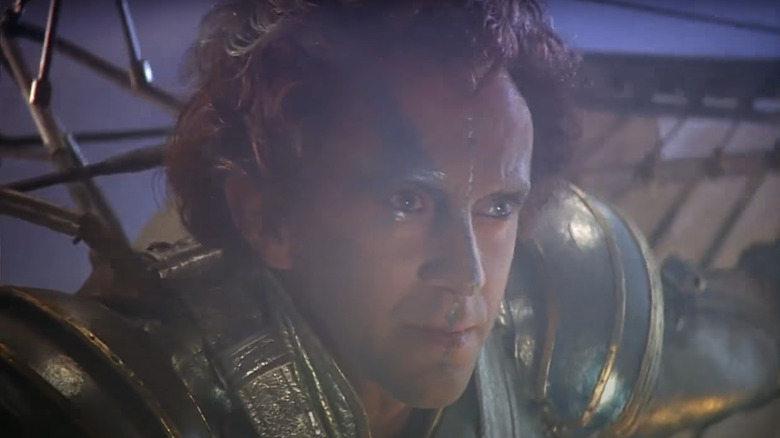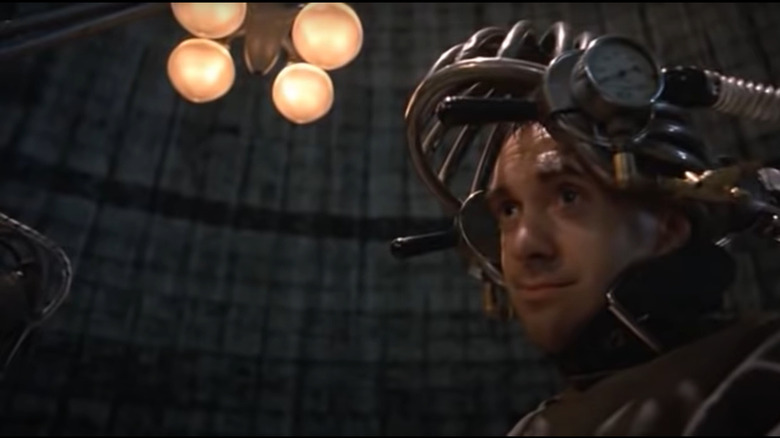The Ending Of Brazil Explained
Terry Gilliam's 1985 dystopian black comedy "Brazil," which the director once described as "Walter Mitty meets Franz Kafka" (via The New York Times), is one of his most critically lauded films to ate, with a Rotten Tomatoes score of 98%. It was also nominated for two Oscars, including Best Original Screenplay for Gilliam, Tom Stoppard, and Charles McKeown (via IMDb). The director's third post-Pythons film following "The Jabberwocky" (1977) and "Time Bandits" (1981), Gilliam sometimes refers to "Brazil" as part of his "trilogy of imagination" along with "Time Bandits" and "The Adventures of Baron Munchausen" (1988).
According to the film's subtitles, "Brazil" takes place "somewhere in the 20th century," in a fantasy universe in which a totalitarian technocracy dominates the populace with rampant bureaucracy and preposterously overcomplicated machines that never quite work the way they're supposed to. Clearly influenced heavily by George Orwell's "1984," the story follows the misadventures of a lowly government clerk who inadvertently becomes a wanted terrorist thanks to a paperwork error, and subsequently falls afoul of the authorities. Gilliam, with cinematographer Roger Pratt and production designer Norman Garwood, creates an intricately realized world that is at once retro and futuristic, bizarre, grotesque, fantastical, and absurd.
As with many of Gilliam's films, "Brazil" borders on the surreal by blending dream sequences, daydreams, and flights of fantasy with reality, which has led some to question the meaning of the film's final sequence. Furthermore, in a case of life imitating art, we almost didn't get to see Gilliam's original ending due to his own battle with the overbearing authorities of the studio system.
Sam Lowry is a dreamer living in an oppressive world
The central character of "Brazil" is Sam Lowry (Jonathon Pryce), an unlikely hero who actually finds it difficult to act heroically at all, outside of his own fantasies. An obscure and unambitious clerk at the Department of Records, Sam's work life is soul-crushingly boring, gray, and claustrophobic. His only escape is in the colorful and majestic dream world he has created, in which Sam is a winged knight in shining armor, soaring through the clouds and battling monsters on his crusade to save a beautiful maiden.
When a fly gets caught in a printing machine causing a typo at the Ministry of Information, an innocent man named Archibald Buttle is mistakenly targeted as a terrorist, tortured, and killed instead of the real suspect, outlaw HVAC technician Archibald Tuttle (Robert De Niro). Sam's panicked boss Mr. Kurtzmann (Ian Holm) begs him to help cover up the Buttle-Tuttle mistake, and Sam handles the paper trail. When he delivers a check to the distraught widow Buttle (a refund for mistakenly debiting their account for the arrest costs), Sam bumps into the Buttles' neighbor Jill Taylor (Kim Greist), a dead ringer for the damsel from his dreams.
Sam desperately tries to locate his dream girl who, unbeknownst to him, is wanted by the government as a terrorist for her vocal inquiries into the death of Buttle. In order to access Jill's files, Sam even takes a promotion to "Information Retrieval." When Sam does finally locate Jill, he falsifies her records to help her disappear, and the couple goes on the run. After one romantic night together, Sam and Jill are arrested by government soldiers, Jill is allegedly killed during arrest. Sam is taken to Information Retrieval, which ends up being a euphemism for torture.
Sam's happy ending is a fantasy
Constrained to a chair with a contraption strapped to his head, Sam is about to be tortured by a man in a baby mask who reveals himself to be Sam's amiable friend and colleague Jack Lint (Michael Palin). Before the torture can begin, the Ministry is invaded in a scene reminiscent of a Bond movie finale, in which a team of armed revolutionaries in ski masks rappel in, take out Jack Lint and the Ministry guards, and rescue Sam. The guerillas are led by the renegade AC repairman Archibald Tuttle, who escapes with Sam as the Ministry building is destroyed.
During their escape Tuttle is engulfed in an avalanche of papers billowing from the destroyed Ministry (Tuttle had previously told Sam he turned rebel because he couldn't stand all the paperwork), and Sam is left to flee alone. In a nightmarish sequence Sam walks in on a funeral to find his mother has been transformed through plastic surgery and now has Jill's face, falls into the coffin, scrambles up a mountain of ducts, and escapes into a big-rig truck driven by Jill.
Then, just as the couple drives off into the sunset ... it's revealed that this entire final sequence has been a delusion, and Sam is still strapped to the chair in the Ministry awaiting torture.
Jack Lint concludes that Sam is hopelessly insane and has retreated into his fantasy world. The interrogation session is aborted, and the film closes on Sam, left in the torture chamber smiling and humming the film's upbeat theme "Aquarela do Brasil."
An unlikely hero beats the system with imagination
Throughout his career, Terry Gilliam has subverted and satirized traditional narratives of heroism, nobility, and great deeds that many of us grow up with. His "Monty Python" animations graphically and hilariously ridicule the glorious symbols of the British Empire and the Renaissance. "The Fisher King" features a traumatized vagrant, played to perfection by Robin Williams, who lives in a delusional world of Arthurian legend. In "The Brothers Grimm" the titular heroes are scam artists who exploit the public's appetite for fairy tales and folklore. "Baron Munchausen" is a pathological liar whose tall tales of adventure intoxicate the audience despite their probable falsehoods.
Sam Lowry is the protagonist of "Brazil" because he's the main character whose journey we follow, but he's far from a textbook hero. Sam is a cowardly low-level bureaucrat with no ambitions nor aspirations, stuck in an oppressive system but with no plans to rebel. He is obviously not happy in the real world because he constantly drifts into fantasy adventures in which he's the glittering winged knight. When Sam is spurred into action against the authorities, it's not out of some sense of injustice or rebellion, but purely because Jill Layton looks like his dream maiden. Unlike Jill (who's seeking justice for Buttle's wrongful killing), or AC technician Tuttle (who's on a romantic crusade against stifling paperwork), Lowry has no cause to fight for.
Sam Lowry's weakness is ultimately the source of his victory: escapism. Trapped in a grim authoritarian regime against which he has no hope of resistance, Sam retreats into his fantasy world. Realizing that all the might of the Ministry and their Information Retrieval techniques are no match for Sam's imagination, his captors give up on their torture protocols and leave Sam to his happy reveries.
Gilliam had to fight his own battle to keep the ending
Terry Gilliam has said that, in his mind, "Brazil" has a happy ending. Given a body of work that celebrates the power of imagination, including his riotous animation work on "Monty Python" and movies such as "The Fisher King," "The Brothers Grimm," "Twelve Monkeys," and "The Man Who Killed Don Quixote," this makes sense. Trapped in a grim and oppressive reality, Sam Lowry's only escape is through his delusional fantasies, but he is happy in them, and in fact, his imagination saves him from being brutally tortured.
In comparison, when we look at Winston Smith, the protagonist of "1984" — Gilliam's chief literary inspiration for "Brazil" — that character did not have the good fortune of retreating into a delusional paradise. Winston Smith ends up returning from the torture chamber to his same old mundane and oppressive world with the knowledge that he betrayed his lover under torture and is doomed to never break free.
In a fascinating real-life twist on the "Brazil" story, life imitated art in 1985 when Universal Pictures refused to release the film with Gilliam's original ending because it wasn't marketable enough (via The New York Times), even attempting to replace Gilliam's ending with a happier one, known as the "Love Conquers All" cut. Gilliam refused and fought back hard against the studio but to no avail. When the Los Angeles Film Critics Association declared ”Brazil” the best film of the year, Universal scrambled to open the film in its original form for a one-week run to qualify it for the Oscars. Gilliam the dreamer stood his ground against the might of the studio system and prevailed.
